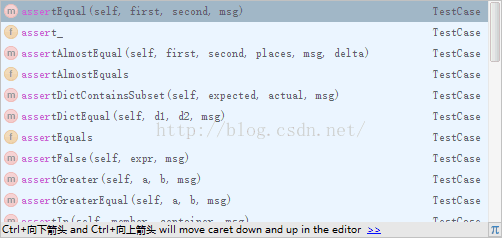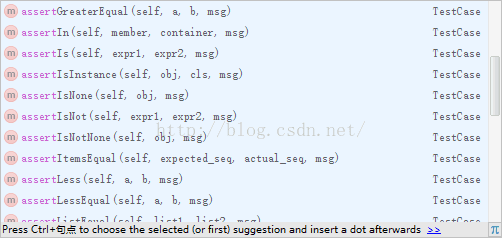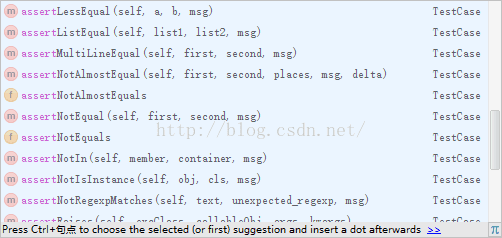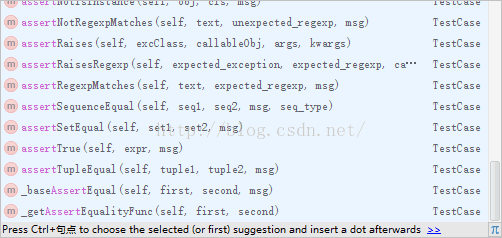python 断言大全
2021-07-09 17:07
标签:条件 分享 dict 图片 fonts 技术 equals ted second 1. 小数位模糊等于 自动化脚本最重要的是断言,正确设置断言以后才能帮助我们判断测试用例执行结果。 在小同事的帮助下,整理了一份比较详细的断言方法。 一、先说说unittest常用的断言吧 常用的就以下几个,网上一搜一大堆。python版本2.7以上都可以调用了。 在官方文档里面看到的整理一下,有些还来不及翻译。 assertAlmostEqual(first, second[, places, ...]) 适用于小数,place是应最少几位相等布尔值才为1(默认为7),如果在place位以内不同则断言失败。 assertDictContainsSubset(expected, actual[, msg]) 检查实际是否超预期 assertDictEqual(d1, d2[, msg]) 前后字典是否相同 assertEqual(first, second[, msg]) 前后两个数不等的话,失败 assertFalse(expr[, msg]) 检查表达式是否为假 assertGreater(a, b[, msg]) 和self.assertTrue(a > b)用法一样,但是多了设置条件 . assertGreaterEqual(a, b[, msg]) 和self.assertTrue(a > =b)用法一样,但是多了设置条件 . assertIn(member, container[, msg]) self.assertTrue(a in b) assertIs(expr1, expr2[, msg]) assertTrue(a is b) assertIsInstance(obj, cls[, msg]) Isinstance(a,b) assertIsNone(obj[, msg]) Obj is none. assertIsNot(expr1, expr2[, msg]) a is not b. assertIsNotNone(obj[, msg]) Obj is not none. assertItemsEqual(expected_seq, actual_seq[, msg]) 一个无序的序列特异性的比较。 assertLess(a, b[, msg]) Just like self.assertTrue(a assertLessEqual(a, b[, msg]) Just like self.assertTrue(a assertListEqual(list1, list2[, msg]) List1与list2是否相等. assertMultiLineEqual(first, second[, msg]) 断言,2个多行字符串是相等的 assertNotAlmostEqual(first, second[, ...]) Fail if the two objects are equal as determined by their difference rounded to the given number of decimal places (default 7) and comparing to zero, or by comparing that the between the two objects is less than the given delta. assertNotAlmostEquals(first, second[, ...]) Fail if the two objects are equal as determined by their difference rounded to the given number of decimal places (default 7) and comparing to zero, or by comparing that the between the two objects is less than the given delta. assertNotEqual(first, second[, msg]) Fail if the two objects are equal as determined by the ‘==’ assertNotEquals(first, second[, msg]) Fail if the two objects are equal as determined by the ‘==’ assertNotIn(member, container[, msg]) Just like self.assertTrue(a not in b), but with a nicer default message. assertNotIsInstance(obj, cls[, msg]) Included for symmetry with assertIsInstance. assertNotRegexpMatches(text, unexpected_regexp) 如果文本匹配正则表达式,将失败。 assertRaises(excClass[, callableObj]) 除非excclass类抛出异常失败 assertRaisesRegexp(expected_exception, ...) 认为在引发异常的情况下消息匹配一个正则表达式。 assertRegexpMatches(text, expected_regexp[, msg]) 测试失败,除非文本匹配正则表达式。 assertSequenceEqual(seq1, seq2[, msg, seq_type]) 有序序列的相等断言 (like lists and tuples). assertSetEqual(set1, set2[, msg]) A set-specific equality assertion. assertTrue(expr[, msg]) Check that the expression is true. assertTupleEqual(tuple1, tuple2[, msg]) A tuple-specific equality assertion. assert_(expr[, msg]) Check that the expression is true. python 断言大全 标签:条件 分享 dict 图片 fonts 技术 equals ted second 原文地址:https://www.cnblogs.com/yoyoma0355/p/9565544.html
断言语法 解释
assertEqual(a, b) 判断a==b
assertNotEqual(a, b) 判断a!=b
assertTrue(x) bool(x) is True
assertFalse(x) bool(x) is False
assertIs(a, b) a is b
assertIsNot(a, b) a is not b
assertIsNone(x) x is None
assertIsNotNone(x) x is not None
assertIn(a, b) a in b
assertNotIn(a, b) a not in b
assertIsInstance(a, b) isinstance(a, b)
assertNotIsInstance(a, b) not isinstance(a, b)
二、最近整理的一些
三、在unittest包里面看到的比较全的断言 



下一篇:python生成器异步使用